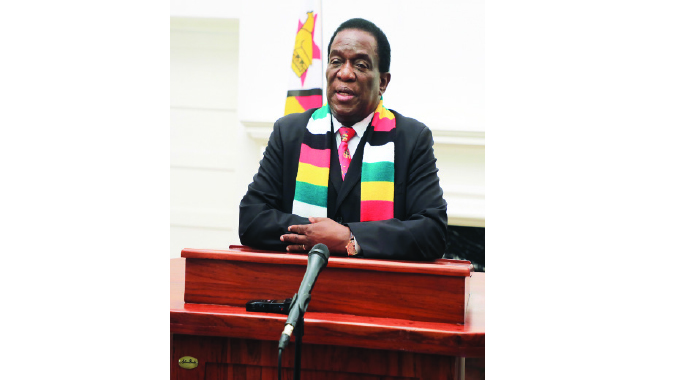Second Republic ushers economic transformation

Prosper Ndlovu, Business Editor
ZIMBABWE’S economy is fast emerging from the woods under the new political administration led by President Mnangagwa, whose transformative leadership has been hailed by business leaders and reputable international organisations.
Since coming into power in November 2017, President Mnangagwa has been credited for championing a comprehensive economic reform agenda, whose outcomes are now being expressed by major milestones scored in reversing historic economic stagnation.
Inspired by the “Zimbabwe is open for business” mantra, the New Dispensation has in the last three years succeeded in revitalising the key productive sectors of the economy and transforming Zimbabwe into a favourable investment destination.
The country expects to achieve Gross Domestic Product (GDP) of 7,8 percent this year, higher than its regional peers and above global estimates, mainly driven by the recovery in the agriculture sector and the resurgent mining and manufacturing industries.
The agriculture sector alone is poised to grow by about 36,2 percent this year, after Treasury revised its estimates recently citing higher output in grains and livestock.
The sector has already achieved the targeted US$8,2 billion economy, which was earmarked for 2025, according to the Minister of Lands, Agriculture, Water, Fisheries and Rural Development, Dr Anxious Masuka.
The mining sector on the other hand is working towards a US$12 billion milestone by 2023, having maintained a steady performance, which continues to anchor the bulk of foreign currency earnings.
As at October this year, the country had earned nearly US$5 billion through mineral exports alone, and was expected to close the year at about US$6 billion, said Mines and Mining Development Deputy Minister, Polite Kambamura.
Under the New Dispensation, the manufacturing sector is making strides, evidenced by the growth in capacity utilisation from 36 percent in 2019 to 47 percent last year and 54 percent in the second quarter of 2021, statistics from the Confederation of Zimbabwe Industries (CZI) show.
Based on this momentum, industry leaders have projected further jump incapacity utilisation to 61 percent by the end of this year.
Despite the adverse impact of Covid-19 lockdown since 2020, and earlier shocks such as Cyclone Idai and climate-change induced drought conditions, Zimbabwe’s economy has exhibited immense resilience, Finance and Economic Development Minister, Professor Mthuli Ncube has said.
There have been increased investments in the health sector under the Covid-19 spell, which saw the Treasury pumping in about US$100 million this year using surplus budget resources.
The drive towards digitisation of the economy has added huge impetus to the country’s resilience by enabling remote transacting and business continuity amid lockdowns.
“Those sectors are the ones that are leading the charge in terms of economic recovery and the results speak for themselves,” said Prof Ncube.
“Look at the whole macro-economic environment, that progress can only happen in an environment of stability.
“The macro-economic stability has been engendered, we can compare where we are and to the last quarter of 2018 when we came into Government, right through 2019.”
CBZ Holdings Limited chairman, Mr Marc Holtzman has said that Zimbabwe’s economy currently possesses extreme potential, and singled out agriculture as a major driving force.
“In my 40 years in investment banking experience living in Russia Eastern Europe, Hong Kong and Asia and other parts of Africa, the economy today in Zimbabwe is maybe the most exciting frontier emerging market that I have seen and I say it for several reasons,” he said in an interview with CNBC Africa.
“Just look at the agriculture sector, the hectarage of the blueberry farms, macadamia nuts, seed oil, high-value crops…that farmers are moving towards from tobacco and other crops, it is incredibly inspiring.”
Global finance giants like the World Bank and the International Monetary Fund (IMF), have also commended the positive strides being registered by Zimbabwe on the economy front.
Following the recent conclusion of its staff mission to Zimbabwe, the IMF team has praised the Zimbabwean administration for being able to tackle budget deficits and reserve money growth as a way to contain inflationary pressures.
“The IMF mission notes the authorities’ significant efforts to stem inflationary pressures. In this regard, contained budget deficits and reserve money growth, higher monetary policy rates, and more flexibility in the RBZ auction exchange rate, are policy measures in the right direction,” it said.
The positive strides in the economy are happening under a framework of key reforms undertaken by the Government – beginning with the short-term Transitional Stabilisation Programme (TSP), which brought austerity measures aimed at fiscal consolidation.
This has created an environment of a balanced budget and fiscal stability, shown by weakening inflationary pressures and relative exchange rate stability, which is assisting in price discovery, said Prof Ncube.
The country is now focused on the National Development Strategy 1 (NDS1:2021-2025), building the momentum towards Vision 2030 of an upper middle-income economy.
The widened fiscal space has allowed the Government to channel more domestic resources towards massive capital projects including major infrastructure projects in Matabeleland, which have remained in limbo for many years.











Comments